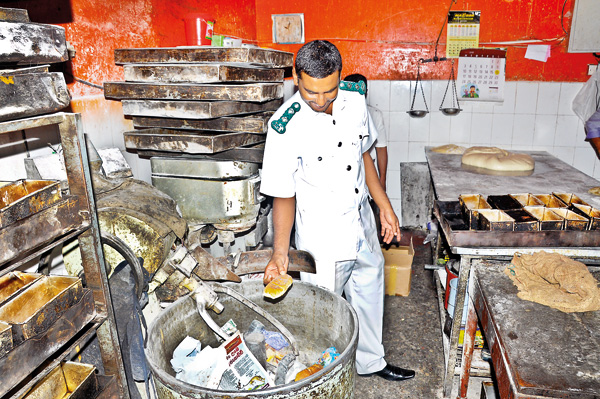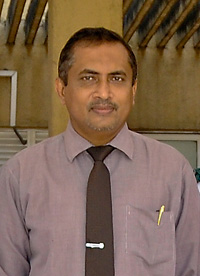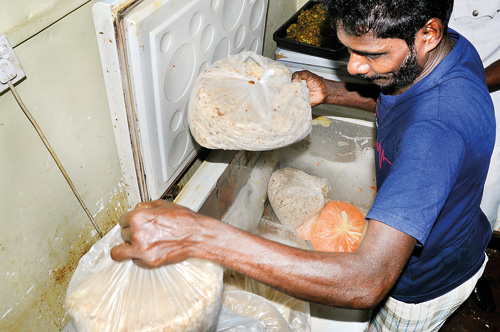News
One rat and seeni sambol bun, please

These pictures captured by our photographer Ishanka Sunimal at a bakery (above)and eatery (below) in Maradana speak for themselves
Inside a bakery in Deans Road, Maradana, health officials of the Colombo Municipal Council were jolted when a rat darted towards them. It had been hiding inside stacked metal trays used to bake bread.

Dr Sasanka Ranasinghe
The floor of the baking areas had layers of dust. The table on which the dough was kneaded had dust too and fungus was growing in some areas. Cockroaches were running hither and thither under the table where sacks of flour, with expiry dates long past, were stacked.
Stale buns and empty bottles lay strewn around.
All this was in marked contrast to the front of the bakery where unsuspecting customers were buying pastries, bread and stuffed buns.
I accompanied Dr Sasanka Ranasinghe, Medical Officer of Health (North Colombo) and his officials as they raided this bakery.
When Public Health Inspectors (PHI) inquired about the stale buns, the owner replied that he was about to throw the stale buns in the garbage truck.
The inspectors, however, believed the buns would be dried and used to make breadcrumbs.
A large rat scampered among trays used to bake bread; a cockroach was spotted in one of the trays.
In a corner of the bakery stood a fridge containing packets of sausages and a bucket of seeni sambol.
Near the entrance, a chocolate cake stood covered in dust on a shelf.
The owner of the shop was ordered to destroy all the food items the inspectors deemed unsuitable for consumption. He faces legal action.

Dr Ruwan Wijeyamuni
This was one of more than 150 raids on eateries and restaurants carried out by teams of PHIs on Tuesday and Wednesday under the supervision of the Colombo Municipal Council Chief Medical Officer Dr Ruwan Wijeyamuni.
“We are ready to take legal action against owners of the eateries if they are found selling, preparing or displaying unhygienic food,” Dr Wijayamuni said.
He said the teams inspected 162 eateries and restaurants in Borella and Maradana and are prosecuting 56 of them.
“On Tuesday, we inspected 68 restaurants and eateries, and on Wednesday we managed to inspect 94 eateries,” he said.
He urged the government to grant teams more powers to immediately close down eateries and restaurants found to be selling food unsuitable for consumption.
Wide-ranging inspections are planned on food outlets in the Colombo District in the coming months on the instructions of Colombo Mayor Rosy Senanayake.

“We will carry out thorough inspections on a mass scale in April to stop street vendors and eatery owners selling unhealthy food around the Sinhala and Tamil New Year,” Dr Wijayamuni said.
Another restaurant at Dean’s Road visited by the PHIs accompanied by the Sunday Times this week looked pleasant enough from the outside but its kitchen looked as if it had not been cleaned for days even though the restaurant has 20 employees.
The floors were dusty and littered with onion peels and pieces of pineapple that could have been there from last week.
There were dustbins left open in every corner, with flies buzzing around.
Five fridges stood in an adjoining small, dark room that smelled foul.
Bags of half-prepared kottu roti, godamba roti and sliced carrot lay in one fridge. The ground underneath was wet, as the fridge had been switched off during the night.
Another cooler was stocked with perished meat and cooked, frozen vegetables that appeared to have been there for months.
Asked for an explanation, the owner of the establishment claimed to be keeping the stale food in the freezers until the garbage truck arrived.
The PHIs were sceptical, pointing out that vendors would never spend on electricity to keep garbage in fridges and therefore the food in the freezers had been there to serve customers.
In another room, piles of rat feces were found behind a large electric oven on which bread was piled.
The restaurant owner now faces legal action.
Dr Ranasinghe said authorities had to be ruthless in taking action against vendors selling unsuitable food.
He wants fines to be increased as most vendors end up only paying fines of Rs2,000-10,000, which is insignificant to them.
“If the government provides us more powers to impose closure orders we could be able to stop these vendors from continuing business until they amend their actions,” he said.
He also suggested the government to impose a registration system and make it compulsory for vendors and eatery owners to obtain training on providing hygienic food.
City mayors support the actions being taken by food inspectors.
Galle Mayor Priyantha Sahabandu said strict food inspections would be carried out in his municipality as Galle is a tourist attraction, drawing both foreign and local consumers to eateries and restaurants.
He was unaware of immediate closure orders and said he would look into the matter. “I believe immediate closure of eateries selling unhygienic food is a necessity,” he said.
Kandy Mayor Kesara Senanayake said inspectors in the city had been told to collect evidence and prosecute erring vendors.

